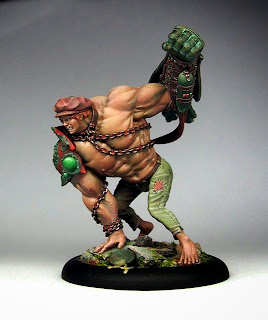MINIATURE GAMING
First a little something for those new to the concept of miniature gaming. In Desperado, as many as 8 or 12 players gather around a game board where model buildings, figures, and animals are used to set the scene. The board becomes the arena that players of online games like Team Fortress are used to, but created with physical models instead of pixels. Dice are rolled to control movement and combat and charts are used to decide who shot whom (and where).
DESPERADO'S STYLE OF MINIATURE GAMING
Desperado is an old-school skirmish wargame. It is not designed for point-based tournaments with one-on-one match-ups. Rather, it is a social game where several people play together, each controlling one or two characters. Generally, players are divided into teams working toward common objectives. I call it a "social" game, because the emphasis is on having a few laughs, and not on cut-throat competition. Losing in a spectacular way is far more entertaining than winning in a game like this.
NUTS AND BOLTS
The turn sequence is driven by cards, with each character taking their entire turn when their card comes up. Movement is limited by dice rolls, so a carefully planned move may be thwarted by a bad toss. Fire is accomplished with percentile dice (two 10-sided dice which represent the "ones" and "tens" places), and takes into account range, type of weapon, the number of shots taken in one turn, and a very, very short list of other modifiers.
The wound chart is what probably made Desperado's reputation. When you score a hit, you roll for location and severity on a table that includes probably 30 different results. Players subtract health as they accumulate wounds, and they write down and apply specific penalties (limping, etc.).
Melee rarely happens in this game due to the lethality of fire, but when it does, the system is an opposed die roll with some bonuses and penalties.
The GM (or referee, or judge) is absolutely indispensable, because unlike a game like 40K, there is a subtle role-playing element. The scenarios are not clear "capture the flag" types of things. The game accommodates off-script situations with a generic skill test.
To understand Desperado, one must also grasp the nostalgic element of it. This game came out in 1992, and was one of the first "beer and pretzels" rules. It is by no means perfect, although some of the gaps in the original were filled in with the house rules provided in this edition. Thousands of gamers have played this game, and it is beloved by many. When people describe a Desperado game to you, they generally smile and begin recounting a hilarious string of mishaps, explosions, quips, and spectacular shots just as if it had happened to them in the real world. I've watched rules lawyers who start off scoffing at these humble little rules end up laughing alongside everyone else as unlikely but entertaining things unfold on the game table.
THE FINAL ANALYSIS
If you're looking for a point-based "faction"-building style of western game, Desperado is not your ticket. It is, in fact, meant to be the game you play at 8:00pm at the convention after a day of hard tournament gaming. It takes no preparation from the players, and a minimal amount from the GM. If you play Desperado, I guarantee you will never have to see a therapist because a 12 year-old crushed your ego with his 750-points of Elven gunfighters!
by Forrest Harris,
Editor and co-author of Desperado; The Knuckleduster Edition









































